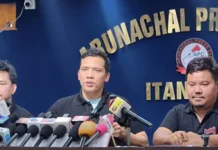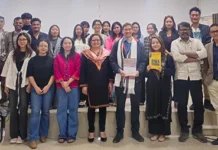
Staff Reporter
ITANAGAR, 19 Jun: The National Green Tribunal (NGT) has termed the ‘Inventorization of sewage treatment plant (STP)’ report submitted by the Arunachal Pradesh State Pollution Control Board (APSPCB) “extremely sketchy and unreliable.”
The report was submitted to the NGT’s eastern zone bench in Kolkata (WB) in response to the petition filed by Youth Mission for Clean River chairman SD Loda, seeking a direction to the respondents to clean stretches of the Senki, Pachin and Dikrong rivers.
Noting that the date of testing of the water samples was 26 November, 2019, the NGT said, “This report does not even indicate from where and how many sites water samples have been collected, and it also does not mention whether the samples have been collected from upstream and downstream of the rivers.”
“The paper book filed by the APSPCB is a report of inventorization of STP of 30 June, 2020, which is almost
one year before the filing of this original application, and it is reported that only two STPs will be commissioned by December, 2021, covering the entire stretch of 145 kms. We find this to be extremely inadequate, considering the stretch of the rivers concerned and the level of pollution present,” the NGT said.
The tribunal directed the counsel for the APSPCB to file a fresh affidavit after taking fresh water samples from upstream and downstream of the rivers in question at various places and, based on the level of pollution, to propose the number of STPs that would be ideally required to keep the entire water stretch pollution-free.
The counsel shall also address the queries of the tribunal as well as the allegations made in the original application, it said.
“The affidavit must also categorically state as to whether in a stretch of 145 kms, two STPs would suffice, and if not, what steps have been taken by the Arunachal Pradesh State PCB for setting up of more STPs,” the NGT order stated.
The APSPCB will also have to identify the polluters and clearly state what action has been taken against the polluters.
“It shall also make an assessment of the damage caused to the environment and the monetary value of such damage, so that the cost may be recovered from the polluters, and it shall also indicate what remedial action has to be taken with regard to the cleaning of the three rivers,” the NGT said.
At the same time, the Central Pollution Control Board (CPCB) submitted a 2015 report to the NGT, which the tribunal said “does not pertain to the issue in question and does not address the allegations made in the original application, specifically with regard to the stretches of rivers Senki, Pachin and Dikrong.”
The CPCB has also been asked to file a fresh affidavit by 27 June.
Earlier, Loda had alleged that “there is considerable pollution and polluting effluents flowing into the Senki, Pachin and Dikrong rivers,” which he said was identified “through various environment pollution assessments carried out over a period from 2009 to 2011 and 2018.”
He had filed an application seeking cleaning of the rivers by the ministry of environment, forests and climate change, the state’s chief secretary, the CPCB and the APSPCB, which was heard on 13 April.
Speaking about the dangers of river pollution, Loda said, “Many streams have already gone underground and some are on the verge of depletion. The volume of Senki, Pachin and Dikrong is reducing day by day. Illegal sand and boulder mining is one of the causes for destruction of the riverbeds of this river stretch. If the trend continues, Itanagar capital region will run out of water.”
“Yagamsaw stream, one of the main tributaries of the Senki river, once one of the cleanest water bodies and home to various species, is now a mere sewage carrier (household waste, human excreta, municipal waste, medical waste, etc) because it passes through the middle of Itanagar city. Another tributary, the Lagun river, which passes through Naharlagun, contributes to 60 percent pollution of Senki, Pachin and Dikrong rivers,” he said.





